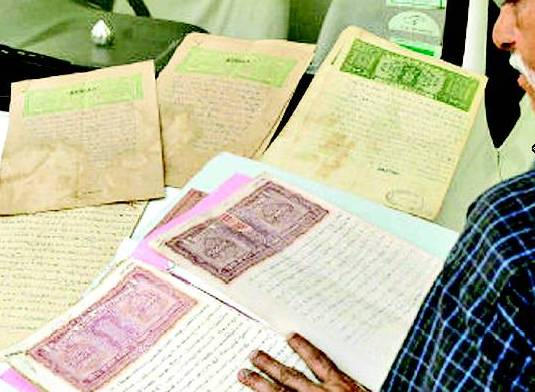Checklist of Important Property Documents- All You Need to Know

- Author: Vikas Tawar
Highlights
You must also be aware of the documents that should be in your possession in original form to avoid the hassles at the time of sale.
Ratification Deed is also called supplementary agreement, it is required to arrive into in case any changes are to be made in the Principal Clause.
Occupancy Certificate is issued when the construction is completed according to the sanctioned plan and is ready for occupancy.
India is a country of strict and lengthy documentation procedures. Major paperwork is demanded in fulfilling all the formalities before you can finally own a property. It is very important to have a good understanding of this paper work and to be aware of what each document says. Signing blindly will only get you in trouble in future. You must also be aware of the documents that should be in your possession in original form to avoid the hassles at the time of sale. Here is an important checklist of property documents you need to have a look at!
1. Sale Deed:
Also called Title Deed, Mother Deed or Conveyance Deed, it is the major evidence of sale and transfer of ownership of property from the seller to buyer. It is also essential for the buyer at the time of resale to ensure the other party that he is the legal owner of the property. To add on, it is a proof of acceptance of the sale agreement, by the buyer. Sale deed must be registered with the registrar under whose jurisdiction the property bought is located, within 4 months from the date of execution. The buyer must possess this document in its original form. It is required for a property purchase or taking a home loan.
2. RTC Extracts:
This document issued by the Village Accountant includes details of the extent of land in a survey or non-survey number, extent of Kharab land, names of seller and buyer, their respective holdings and names of the tenants. It also covers the details regarding the kind of soil, any mortgages, charges made on the properties, the status of land, conversion order number, date if any property was converted from agricultural to non-agricultural land, references to mutation, inheritance certificates, etc. It is basically required to establish the title of land in case the property is located on a non-agricultural land, which earlier used to be agricultural. You don’t need to have this document in original form but you must have a copy for the purpose of purchasing the property.
3. Khata Certificate and Extracts:
This is basically an entry in local municipal committee’s records and confirms that the property has been constructed as per the laid down and approved the plan. This document is required for registration of new property and for the transfer of any property. Khata Extract is required to get a trade license. This certificate is mandatory for property purchase and home loan, in its original form.
4. Mutation Register Extracts:
Similar to RTC extracts, its used to establish a title if the property is built on a converted land. The original copy of this document isn’t mandatory.
5. Joint Development Agreement:
This agreement is established in cases where the seller (land owner) contributes the land and buyer (builder) undertakes any development activity on it. This document conveys which party does the original title of property rests with and it is not required in its original form.
6. General Power of Attorney:
Power of attorney is the authority a buyer hands over to the person, making him his legal representative who can take legal and financial decisions including the sale or purchase of property on buyer’s behalf. It is an important document and must be in its original form.
7. NOC:
They are the government approvals for electricity supply, water supply, etc. the builder needs to have before he can start construction. These approvals are mandatory to ensure that all the required government approvals are in place.
8. Ratification Deed:
Also called supplementary agreement, it is required to arrive into in case any changes are to be made in the Principal Clause. It also avoids any future shock on modified clauses, you might be unaware of. The original copy isn’t required to be kept.
9. Allotment Letter:
It is issued to the buyer by the builder/ housing society at the time of applying for a bank loan to buy a property. It mentions the amount of money the buyer has already paid to the builder to confirm that the loan amount asked for by the buyer is reasonable and is equal to the remaining, unpaid amount. This document must be shown in its original form.
10. The copy of Possession Letter:
It confirms the delivery of the property from builder to the buyer on the date mentioned in the letter. It is mandatory and should be in its original form.
11. Payment Receipts:
The original payment receipt must be collected from the builder as a solid proof of payment. The original form is required.
12. Encumbrance Certificate:
In the case of resale, this certificate is shown to the new buyer to inform him of all the transactions that have occurred since the purchase of the property from the first seller. It confirms that the title of the property is still with the person selling it. Original copy of this certificate is required.
13. No Due Certificate:
A no due certificate from the Apartments Owners Association is required to ensure that the owner has cleared all his dues. This is also required in its original form.
14. Completion Certificate:
A completion certificate from municipal authorities is required to show whether the building complies with the rules relating to permissible building heights, distance from the road, etc. It ensures that the building is constructed according to approved plan.
15. Occupancy Certificate:
It is issued when the construction is completed according to the sanctioned plan and is ready for occupancy.
These were some of the important documents you must know about especially if you are going to try your luck in real estate. I hope this helped in enhancing your knowledge and I’d advise you to do a more detailed and thorough study of documents before rushing into signing any of them. Crack a good deal!
More Articles
- Online Listing Tips for Real Estate Agents
- How to start a Real Estate business in India - a complete guide !
- Renting Vs Buying property - How will you decide?
- What you should do in Property Management services
- Home Loan Insurance
- How to choose your builder?
- How to ensure fire safety in your home!
- Tips To Keep In Mind While Taking A Home On Rent
- Importance of Home Security
- How to plan your property budget?
- Leased vs. Purchased vs. Co-Working Office Spaces
- Easy Tips to Build an Eco Friendly Home
- Sample Flat - A Trick by a Builder?
- How to have a Beautiful Guest Room? Impress your Guests with these Guest Room Ideas..
- Understanding MCLR and its Effects on Home Loans
- 5 simple ways to close a real estate deal
- Is it worth to buy property near an airport ?
- Home loan tax benefit
- How to be successful in business as an introvert
- Cost effective home decor ideas
- What to Be-Paying Guest or a Tenant??
- Complete guide to start your small business
- Sports township- New trend in India
- Online Listing Tips for Real Estate Agents
- Understanding Floor Area Ratio- FAR
- Town and Country Planning | Meaning and Importance
- Checklist of Important Property Documents- All You Need to Know
- Role of CREDAI in real estate
Copyright © 2023 RERA Filing. All rights reserved.
 Rera
Act
Rera
Act
 Maharashtra
Maharashtra Karnataka
Karnataka Andhra Pradesh
Andhra Pradesh Uttar Pradesh
Uttar Pradesh